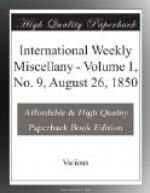Mr. Griswold, we suppose, is quite right in suggesting that the only name in modern times to which reference can with any fitness be made for purposes of analogy or comparison with Webster is that of Burke. In many respects there is a correspondence between their characters; in some others they differ widely. As a prophet of the truth of political morals, as a revealer of those essential elements in the constitution of life, upon which, or of which, society is constructed and government evolved, Burke had no peer. In that department he rises into the distance and grandeur of inspiration; nil mortote sonans. Nor do we doubt that the Providence of God had raised him up for the purposes of public safety and guidance, any more than we doubt the mission of Jeremiah or Elisha, or any other of the school of the Lord’s prophets. But leaving Burke unapproached in this region of the nature and philosophy of government, and looking at him, in his general career, as a man of intellect and action, we might indicate an analogy of this kind, that the character, temper and reason of Burke seem to be almost an image of the English constitution, and Webster’s of the American. To get the key to Burke’s somewhat irregular and startling career, it is necessary, to study the idea of the old whig constitution of the English monarchy: viewing his course from that point of view, we comprehend his almost countenancing and encouraging rebellion in the case of the American colonies; his intense hostility to Warren Hastings’ imperial system; his unchastised earnestness in opposition to French maxims in the decline of his life. The constitution of the United States, that most wonderful of the emanations of providential wisdom, seems to be not only the home of Webster’s affections and seat of his proudest hopes, but the very type of his understanding and fountain of his intellectual strength:
——“hic
illius arma;——
Hic currus.”
The genius of Burke, like the one, was inexhaustible in resources, so composite and so averse from theory as to appear incongruous, but justified in the result; not formal, not always entirely perspicuous. Webster’s mind, like the other, is eminently logical, reduced into principles, orderly, distinct, reconciling abstraction with convenience, various in manifestation, yet pervaded by an unity of character.
Mr. Webster has not merely illustrated a great range of mental powers and accomplishments, but has filled, in the eye of the nation, on a great scale, and to the farthest reach of their exigency, a diversity of intellectual characters; while the manner in which Burke’s wisdom displayed itself was usually the same. We cannot suppose that Burke could have been a great lawyer. Webster possesses a consummate legal judgment and prodigious powers of legal logic, and is felt to be the highest authority on a great question of law in this country. The demonstrative faculty; the capacity to analyze and




